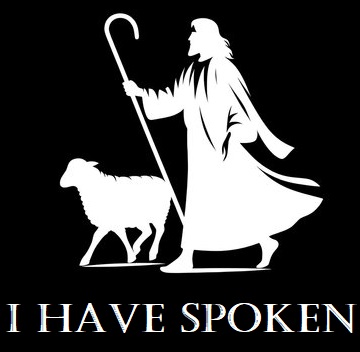I Have Spoken
By Anthony Casperson
2-1-25
How many people heard the title in Nick Nolte’s voice while picturing the above character?
That’s the character Kuiil from several episodes of the first season of The Mandalorian. And his catchphrase of, “I have spoken,” became a meme rather quickly. Typically used in a manner equating, “There will be no arguing.”
In the Disney Star Wars universe, the phrase is used by Ugnaughts—yes, that’s what that species is called—so as to indicate that they’ve decided upon something. And they won’t change their minds. Although, from what I remember of the show, the phrase had a belligerent connotation that carried the unspoken question of, “Why are we still talking about this?”
To my surprise, this character came to mind over a month ago, early on in my reading through the book of Ezekiel for my morning devotions. And I had to laugh when I heard Nick Nolte’s voice come through when reading the words of God.
See, in Ezekiel 5:13-17, the phrase repeats three times. Each of which is in the context of God bringing about judgement on Israel for their idolatry. The people had rejected God and his ways, therefore judgement is upon them. They should expect no other result for their actions.
Over the next month, I’ve found it interesting that the words “I have spoken” appear so often in the book of Ezekiel that it’s almost a catchphrase of the prophet’s work. When you see that it’s used twenty times throughout the book—usually preceded by “I am the Lord”—it kinda stands out. Although admittedly, it’s found in condensed clusters, as opposed to an even spread.
And that count of twenty doesn’t include Ezek. 22:14, where the phrase is “I, the Lord, have spoken.” Nor does it include Ezek. 13:7, where God specifically calls out the false prophets for saying, “declares the Lord,” when God denies their words by saying, “I have not spoken.”
Having witnessed all of this trivia about the phrase, we might find ourselves thinking that God is just as belligerent as Kuiil. We might consider that God means that since he’s decided, it will be. No arguments allowed. And we almost need not do anything more than point to Ezek. 24:14 to prove the validity of that idea. “I am the Lord. I have spoken; it shall come to pass; I will do it. I will not go back; I will not spare; I will not relent; according to your ways and your deeds you will be judged, declares the Lord God.”
But there is one thing that Yahweh has that Kuiil doesn’t. Something that no Ugnaught has.
Complete authority.
God is the Creator of the universe. He set the world into motion. Formed the boundaries of the land and sea. Placed the stars exactly where he intended. And declares exactly how his entire creation works. It is his right, for he is the one who made and designed all things.
Therefore, when he says, “I am the Lord; I have spoken,” those aren’t the words of a belligerent being stomping his foot in the ground until everyone agrees with him. They’re the words of the one whose very will designed the truth of all things. Words of the owner’s manual—which he wrote.
And the words, “I have spoken” carry that creative mindset even more than “declares the Lord” ever could. After all, God spoke, “Let there be light.” And there was light. His method of creation came through the words he spoke. He spoke; and it came to exist. He has spoken; and so it is.
But lest we consider that the only things that he has spoken are words of judgement, let’s end by looking at the good news that he has spoken in Ezek. 34:22-31:
I will rescue my flock; they shall no longer be a prey. And I will judge between sheep and sheep. And I will set up over them one shepherd, my servant David, and he shall feed them: he shall feed them and be their shepherd. And I, the Lord, will be their God, and my servant David shall be prince among them. I am the Lord; I have spoken. I will make with them a covenant of peace and banish wild beasts from the land, so that they may dwell securely in the wilderness and sleep in the woods. And I will make them and the places all around my hill a blessing, and I will send down the showers in their season; they shall be showers of blessing. And the trees of the field shall yield their fruit, and the earth shall yield its increase, and they shall be secure in their land. And they shall know that I am the Lord, when I break the bars of their yoke, and deliver them from the hand of those who enslaved them. They shall no more be a prey to the nations, nor shall the beasts of the land devour them. They shall dwell securely, and none shall make them afraid. And I will provide for them renowned plantations so that they shall no more be consumed with hunger in the land, and no longer suffer the reproach of the nations. And they shall know that I am the Lord their God with them, and that they, the house of Israel, are my people, declares the Lord God. And you are my sheep, human sheep of my pasture, and I am your God, declares the Lord God. (ESV)
Specifically, these words are for the exiled nation of Judah. However, they show us the kind of God we followers of Jesus serve. The one who saves and rescues his people. The one who provides, not because of anything that we’ve done, but merely because he has spoken.
And we know that the words relate to Jesus because he is the shepherd, the “servant David” that the Father sets over his flock. That’s even where the phrase “I have spoken” appears in this passage.
In God’s complete authority over all of creation, he has spoken. And his act of saving those who are his, through his servant “David,” is among the best things that he has spoken.
Let’s not look at the order he spoke into his creation—nor the judgement against sin that he speaks—and see someone with a belligerent will crossing their arms and stomping around until we all finally go along with their ridiculous demands. Rather, let us stand in awe of the words he speaks that bring about creation and life and restoration.
And join him in the truth that he has spoken.



